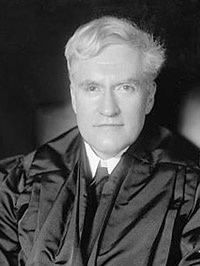Revue de presse de l'Histoire - La Seconde guerre mondiale le cinéma les acteurs et les actrices de l'époque - les périodes de conflits mondiales viètnamm corée indochine algérie, journalistes, et acteurs des médias
Benjamin Cardozo (1870-1938), the orphaned, home-schooled son of a disgraced jurist who became an influential legal scholar, lecturer, appellate court chief justice, and a justice of the United States Supreme Court, passed the bar examination without completing law school.
 A quiet, reserved, and brilliant man, Cardozo preferred writing appellate briefs and legal tomes to arguing property and civil cases before a jury. Yet, in 1913, when anti-Tammany Hall Democrats asked him to be their candidate for the New York Supreme Court, he agreed to campaign, winning by less than 1% of the vote.
A quiet, reserved, and brilliant man, Cardozo preferred writing appellate briefs and legal tomes to arguing property and civil cases before a jury. Yet, in 1913, when anti-Tammany Hall Democrats asked him to be their candidate for the New York Supreme Court, he agreed to campaign, winning by less than 1% of the vote.
Three months into his service, however, Governor Martin Glynn appointed him to the state Court of Appeals, where Cardozo rose to the rank of chief justice before being tapped by Herbert Hoover in February 1932 to fill the vacancy Oliver Wendell Holmes's retirement left on the U.S. Supreme Court. The Senate, impressed by both Cardozo's jurisprudence and his leadership of the American Law Institute, unanimously and rapidly confirmed him. Cardozo's commitment to judicial restraint continued to influence many of his opinions and helped guide his interpretation of New Deal legislation.
In his 1935 dissenting opinion in the Stewart Dry Goods case, he argued that a state did have the power to tax a business's gross receipts rather than net profit as long as "a perverse or vengeful spirit" did motivate the policy and the state sought "legitimate ends by means honestly and rationally chosen." In 1936, he disagreed when a conservative majority of the justices overturned legislation establishing maximum working hours and the minimum wage and a statute allowing states and localities to seek bankruptcy protection.
The following year, Cardozo crafted the majority opinion in Helvering v. Davis, rejecting those who argued that the government's plan to fund the old-age pension aspect of the Social Security Act was unconstitutional. The general welfare clause of the Constitution gave Congress this right, he argued. "The hope behind this statute is to save men and women from the rigors of the poor house as well as from the haunting fear that such a lot awaits them when the journey's end is near." A few months after issuing this decision, Cardozo suffered a heart attack, followed in July 1938 by a fatal stroke.